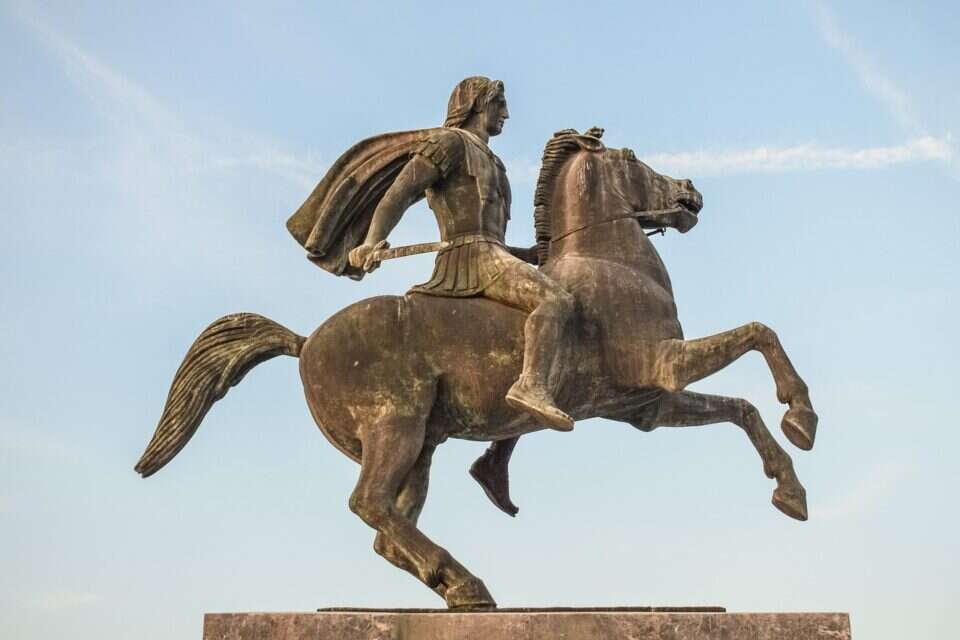Alexander the Great (356 BC - 323 BC), king of Macedonia, is considered one of the greatest military minds in history, who by the age of 30 created one of the largest empires in the ancient world, extending from Greece to Egypt and into northwest India.
As a child he was educated by the Greek philosopher Aristotle.
Even in his lifetime he was given the status of a god.
His greatness is attributed to his unparalleled skills in strategy, leadership, and his ability to inspire loyalty among his soldiers, which allowed him to conquer vast territories without suffering a single defeat in battle.
Alexander's travels spread Greek culture, language, and politics across these regions, fostering the Hellenistic civilization in which Greek and local cultures merged, profoundly influencing the Roman Empire and subsequent Western culture.
His legacy includes the spread of Greek culture and cities (many named Alexandria) throughout his empire, laying the groundwork for the spread of Christianity and the rise of the Roman and Byzantine empires.
Alexander's achievements in war, culture and his vision for a united empire indicate why he is considered 'great'.
Netflix's New Miniseries Explores Controversial Take on Alexander The Great's Love Life https://t.co/9dSxF47npe pic.twitter.com/coaz14PwM1
— Greek City Times (@greekcitytimes) January 31, 2024
In the recent Netflix series, 'Alexander: The Making of a God', Alexander the Great is very clearly represented as gay.
The series, a mix of documentary-style interviews with historians and lavish dramatic reenactments, has rekindled speculation about the sexuality of Alexander the Great (played by Buck Braithwaite).
The implicit representation quickly led to a topic for discussion and controversy.
Some viewers praised the series for including LGBTQ+ characters, while others criticized it for being historically inaccurate.
Netflix: Viewers react angrily to the documentary showing Alexander the Great kissing Hephaestion - "There's no historical evidence" https://t.co/LkJ5h3Vnqb pic.twitter.com/KB19ILLoqK
— Greek City Times (@greekcitytimes) February 2, 2024
Alexander the Great's sexuality has indeed been a subject of speculation and debate among historians and scholars for many years.
This debate stems in part from the nature of the available sources and the cultural context of Alexander's time.
Ancient texts, including those by writers such as Plutarch, Arrian, and Curtius Rufus, describe Alexander's private life, including his close relationships with men, most notably the Phaston.
The relationship between Alexander and Hephaston was multifaceted and very complex, with interpretations stretching from close friendship to romantic love.
They were childhood friends who grew up together, shared a common education, adventures and unwavering loyalty.
In adulthood they had inseparable allies;
The Faston served as Alexander's confidant, second in command and fierce companion for battle.
He was not only an irreplaceable friend, but also a comrade in arms.
In fact, Hephaeston was the second person in the empire after Alexander.
Just watched Alexander the Great on Netflix.
Am considering starting 13 new companies and attacking a country tomorrow.
pic.twitter.com/ofDhd8tyso
— CC Hansson (@CarlHansson7) February 1, 2024
Their relationship was intense.
This friendship lasted all their lives, and it was compared to that of the great warrior of Greek mythology Achilles and his best friend Patroclus, the hero of the Trojan War.
Ancient sources describe their relationship as unique, surpassing typical friendships.
Alexander arranged for Heston to marry the sister of his second wife Statris, so that their children would be cousins.
Public displays of affection between the two, such as shared baths, have fueled speculation.
While the historical evidence is inconclusive, some scholars view their relationship as romantic, citing emotional expressions.
Others argue that intense, non-sexual companionship reflects male companionship and nurturing practices in ancient Greek culture.
In any case, the sudden death of Hephaston, apparently from malaria, deeply affected Alexander who mourned his friend for a long time.
Eight months later Alexander himself died a mysterious death.
View this post on Instagram
A post shared by FORWARD YOUR GAZE (@forward.your.gaze)
These ancient accounts of the relationship between Alexander and Hephaestus do not ignore Alexander's three marriages, but also mention that the marriages had strategic motives, mainly alliances with branches of the Persian royal house.
Only Alexander's first wife, Roxana, bore him a child.
The other two, Statira and Pryceitis, bore him no children, leading some historians to believe that he may not have been really interested in women sexually.
The challenge in interpreting these relationships stems from the vastly different cultural and social norms regarding sexuality in Alexander's time compared to today.
The ancient Greeks did not have the same concepts of sexual orientation that exist today;
Relationships were viewed through different lenses, and the distinction between platonic and romantic or sexual relationships was not always as clearly defined as it is in contemporary times.
Ancient Macedonia was not completely opposed to same-sex relationships, but social expectations pushed towards marriage and procreation.
Historians and classicists often caution against applying modern labels or interpretations directly to historical figures without considering the historical and cultural context in which they lived.
Thus, while there is speculation and debate about Alexander's sexuality, it is essential to approach the subject with an understanding of the complexities involved in interpreting ancient sources and an acknowledgment of the differences in social norms regarding sexuality throughout history.
While his emotional connection with the Faston was intense, explicit concrete evidence of a relationship of a romantic nature remains elusive.
Were we wrong?
We will fix it!
If you found an error in the article, we would appreciate it if you shared it with us

